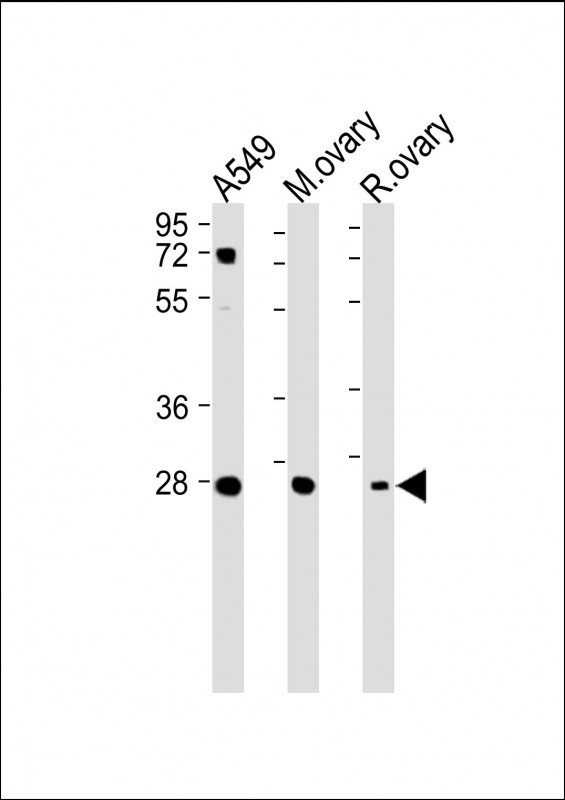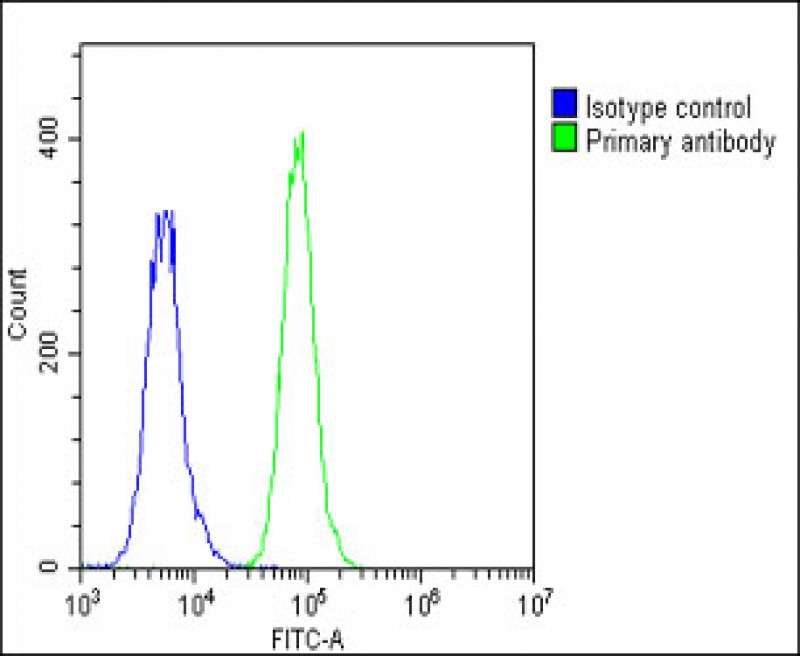

| WB | 1/2000 | Human,Mouse,Rat |
| IF | 咨询技术 | Human,Mouse,Rat |
| IHC | 咨询技术 | Human,Mouse,Rat |
| ICC | 技术咨询 | Human,Mouse,Rat |
| FCM | 1/25 | Human,Mouse,Rat |
| Elisa | 咨询技术 | Human,Mouse,Rat |
| Aliases | Insulin-like growth factor-binding protein 4, IBP-4, IGF-binding protein 4, IGFBP-4, IGFBP4, IBP4 |
| Entrez GeneID | 3487 |
| WB Predicted band size | 27.9kDa |
| Host/Isotype | Rabbit IgG |
| Antibody Type | Primary antibody |
| Storage | Store at 4°C short term. Aliquot and store at -20°C long term. Avoid freeze/thaw cycles. |
| Species Reactivity | Human, Mouse, Rat |
| Immunogen | This IGFBP4 antibody is generated from rabbits immunized with a KLH conjugated synthetic peptide between 66-92 amino acids from the N-terminal region of human IGFBP4. |
| Formulation | Purified antibody in PBS with 0.05% sodium azide. |
+ +
以下是关于IGFBP4(N-term)抗体的3篇参考文献,涵盖不同研究领域:
1. **"IGFBP4 N-terminal fragments inhibit angiogenesis via modulation of Wnt signaling"**
- **作者**: Kim et al.
- **摘要**: 研究利用抗IGFBP4(N-term)抗体鉴定其N端片段在肿瘤微环境中的作用,发现片段通过调控Wnt信号通路抑制血管生成,提示其作为癌症治疗靶点的潜力。
2. **"Proteolytic processing of IGFBP4 in placental development: Role of pregnancy-associated plasma protein-A"**
- **作者**: Overgaard et al.
- **摘要**: 通过抗IGFBP4(N-term)抗体的Western blot分析,揭示胎盘发育中IGFBP4的蛋白水解过程依赖于PAPP-A酶活性,影响胎儿生长调控机制。
3. **"Circulating IGFBP4 levels as a biomarker of cardiovascular risk in postmenopausal women"**
- **作者**: Bayes-Genis et al.
- **摘要**: 使用抗IGFBP4(N-term)抗体的ELISA检测,发现血清中IGFBP4水平升高与绝经后女性心血管事件风险显著相关,提示其作为临床生物标志物的价值。
4. **"IGFBP4 interacts with fibrillin-1 to regulate TGF-β activation in Marfan syndrome"**
- **作者**: Nistala et al.
- **摘要**: 免疫共沉淀结合抗IGFBP4(N-term)抗体证实,IGFBP4通过与fibrillin-1结合调控TGF-β活化,为马凡综合征的分子机制提供新见解。
以上文献均明确涉及IGFBP4(N-term)抗体的应用,涵盖癌症、胎盘发育、心血管疾病及遗传病研究。
The IGFBP4 (N-term) antibody is a specialized tool designed to detect insulin-like growth factor-binding protein 4 (IGFBP4) by targeting its N-terminal region. IGFBP4. a member of the IGFBP family, regulates the bioavailability and activity of insulin-like growth factors (IGF-I and IGF-II) by binding to them with high affinity, modulating their interactions with IGF receptors. This protein plays critical roles in cell growth, differentiation, and apoptosis, and is implicated in diseases such as cancer, cardiovascular disorders, and metabolic syndromes. The N-terminal domain of IGFBP4 is essential for IGF binding and interaction with extracellular matrix components or cell-surface proteins.
The IGFBP4 (N-term) antibody is commonly used in techniques like Western blot (WB), immunohistochemistry (IHC), and ELISA to study IGFBP4 expression, localization, and post-translational modifications. Its specificity for the N-terminus ensures recognition of full-length IGFBP4. distinguishing it from potential cleavage products or isoforms. Researchers employ this antibody to explore IGFBP4's role in tissue development, tumor progression (e.g., in breast or colorectal cancer), and metabolic regulation. Validation steps, such as knockout controls or peptide competition assays, are recommended to confirm antibody specificity, as cross-reactivity with other IGFBP family members may occur. This tool is vital for dissecting IGF axis mechanisms in physiological and pathological contexts.
×